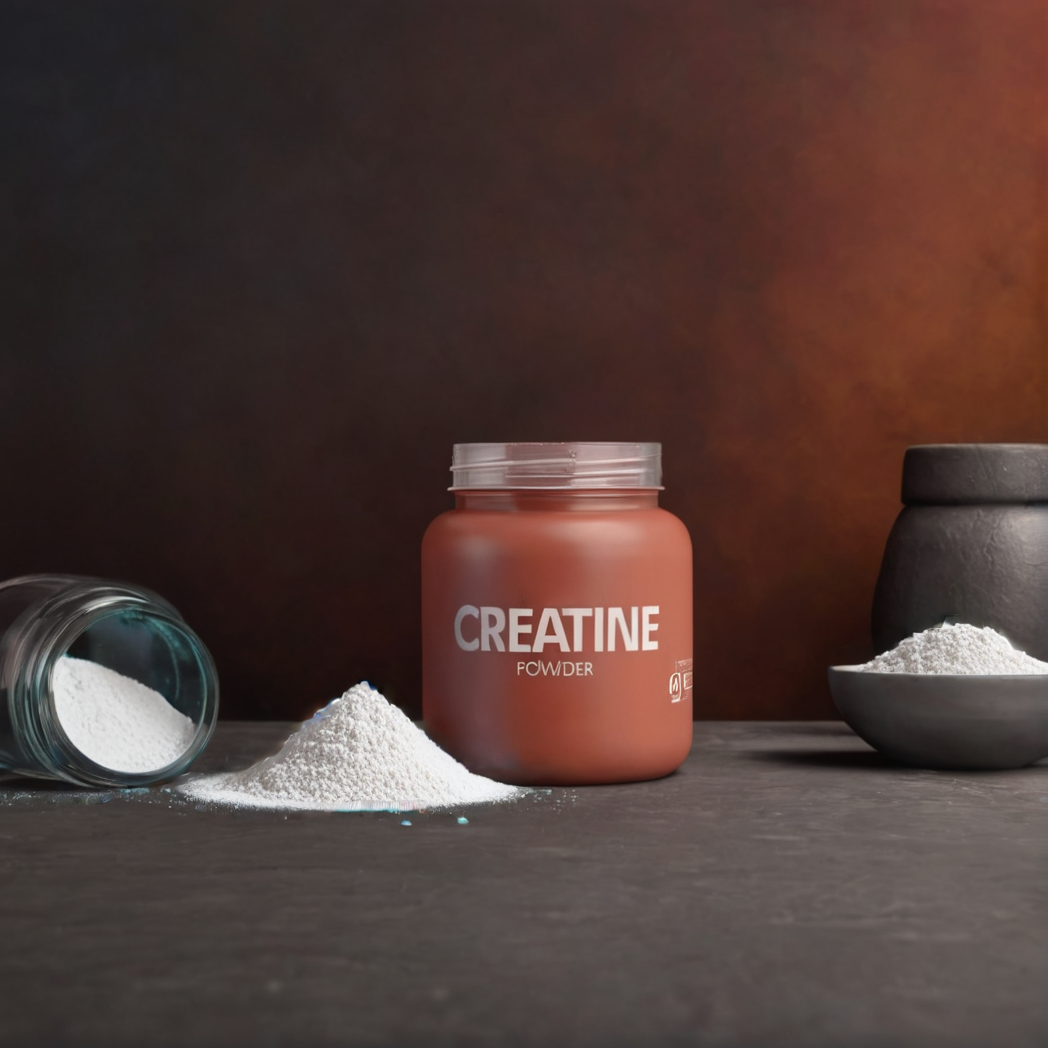What’s So Great About Creatine Anyway?
Creatine has acquired quite a bit of attention over the last few years, but is the hype around creatine real? Creatine has been associated and stigmatized as the “gym-bro supplement” but it actually has quite a plethora of uses other than just getting big in the gym. It also has benefits for recovery, cognitive benefits to improve focus, and many neuroprotective properties.
What is Creatine?
Creatine is actually a compound that is naturally occurring in all of our bodies as an amino acid! Our bodies make creatine, and we also consume it in our diets via foods such as red meat and seafood. We use creatine as an energy source in the form of phosphocreatine (PCr), and when we don’t need it, its stored in our muscles to be used at a later date. ~95% of creatine our body makes and ingests is stored in our muscles, and the other 5% is stored in our brain and testes. Creatine is the most readily available form of energy that our bodies use, and it gets used up in less than 10 seconds of activity! According to research we can increase our phosphocreatine stores by 15-40% by supplementation.
How can creatine help with aging?
Creatine has been found to promote healthy aging in a number of different ways. Here is a list of health status measures that creatine can improve:
- Lower triglyceride and cholesterol levels
- Reduce fat accumulation in the liver
- Act as an antioxidant in the body
- Improve glycemic control (AKA help control blood sugar)
- Slow tumor growth in some types of cancer
- Increase strength and muscle mass
- Slow down bone loss
- Positively influence cognitive function
- Possibly serve as an antidepressant in some cases
Creatine For Preventative Measures and Brain Health
It has been widely understood that creatine supplementation possess neuroprotective benefits. Research findings suggest that creatine supplementation may help protect against acute and chronic neuro degenerative processes, and improve brain bioenergetics to aid in minimizing brain ischemia. Although this research is preliminary, it is hopeful!
- Examples of acute degenerative brain processes → concussion, traumatic brain injury
- Examples of chronic degenerative brain processes → Alzheimer’s disease, Parkinson’s disease, Huntington’s disease
- Examples of causes of brain ischemia→ stroke
Creatine for Focus and Attention
Creatine supplementation can increase brain creatine stores by 5-15%! This increase in brain creatine can help support and improve cognitive function, as well as decrease mental fatigue, no matter the age!
FAQ’s About Creatine: Let’s dive into the research!
There are generally two approaches to creatine supplementation. Dosage may vary depending on body type, age, and intent for use (body building, increasing strength and power for sport, cognitive focus, longevity, etc).
- Loading phase + maintenance phase → most effective and efficient
- Loading phase → 5 grams of creatine monohydrate → 4x / day for 5-7 days
- Maintenance phase → 3-5 grams 1x daily
- Athletes may need to consume more during maintenance phase depending on sport participation.
- Gradual introduction of creatine
- ~3 grams of creatine monohydrate daily for 28 days or more.
Ingesting creatine with carbohydrates and/or protein has been effective in enhancing creatine retention (so we don’t pee it out).
Although the research in children and adolescents is limited compared to adults, the information published has not shown any adverse side effects in children! In fact, adolescents are the largest age group that has self reported using creatine. Although data is limited, there have been multiple studies that report no changes in lab markers that are indicative of changes in kidney function, liver function, changes in inflammatory markers, or self reported side effects.
Nope! There is no evidence muscle creatine decreases below baseline after long term use. Creatine is naturally occurring in our food, so there is little to no risk of supplementation, and it does not suppress our body from making it naturally on its own.
Creatine is a relatively easy supplement to choose! Here are some things to look for when choosing a creatine monohydrate:
- Creatine monohydrate as the only ingredient, anything else is a filler!
- Third party tested – to ensure you’re getting the product you think you are.
- Optional but suggested: NSF Certified for Sport or Informed Sport
Check out this creatine from a supplement brand that I trust!
My Two Cents!
Among a plethora of research on creatine, there have been very minimal adverse reactions to incorporating various amounts of creatine supplementation into a diet. The most reported side effect was stomach upset, which could be from anything, honestly! In my opinion, what’s the harm in adding creatine to your diet? Give it a try and tell us if this inspired you to try creatine!
Interested in learning more about creatine? All research spoken about in the post above is linked right here!
Wang, C. C., Fang, C. C., Lee, Y. H., Yang, M. T., & Chan, K. H. (2018). Effects of 4-Week Creatine Supplementation Combined with Complex Training on Muscle Damage and Sport Performance. Nutrients, 10(11), 1640. https://doi.org/10.3390/nu10111640
Jagim AR, Kerksick CM. Creatine Supplementation in Children and Adolescents. Nutrients. 2021 Feb 18;13(2):664. doi: 10.3390/nu13020664. PMID: 33670822; PMCID: PMC7922146.
Wax, B., Kerksick, C. M., Jagim, A. R., Mayo, J. J., Lyons, B. C., & Kreider, R. B. (2021). Creatine for Exercise and Sports Performance, with Recovery Considerations for Healthy Populations. Nutrients, 13(6), 1915. https://doi.org/10.3390/nu13061915
Kreider, R. B., Kalman, D. S., Antonio, J., Ziegenfuss, T. N., Wildman, R., Collins, R., Candow, D. G., Kleiner, S. M., Almada, A. L., & Lopez, H. L. (2017). International Society of Sports Nutrition position stand: safety and efficacy of creatine supplementation in exercise, sport, and medicine. Journal of the International Society of Sports Nutrition, 14, 18. https://doi.org/10.1186/s12970-017-0173-z
Dolan, E., Gualano, B., & Rawson, E. S. (2019). Beyond muscle: the effects of creatine supplementation on brain creatine, cognitive processing, and traumatic brain injury. European journal of sport science, 19(1), 1–14. https://doi.org/10.1080/17461391.2018.1500644

